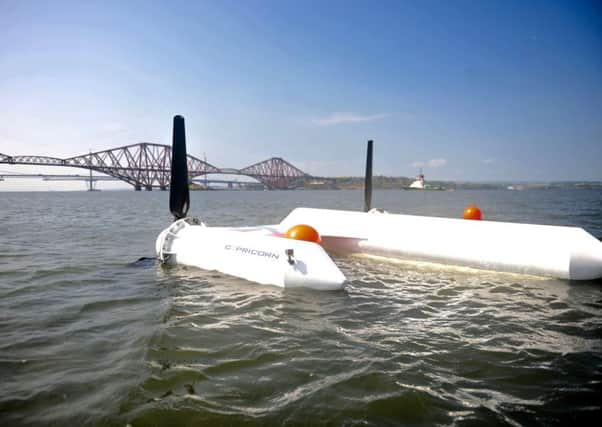High costs risk sinking tidal power


Dr David Anderson and Dr Charlie Silverton, founders of Roslin-based Renewable Devices Marine, say the Crown Estate, which owns most of the seabed around Scotland’s coast, threatened legal action in an attempt to block the recent sea trial of their 50 kilowatt Capricorn device.
The test took place on a privately owned area in the Firth of Forth earlier this month, but the firm was contacted by the Crown Estate. The letter demanded details about the technology, anchoring methods and the area and duration of the trial, warning of possible court proceedings for failure to comply.
Advertisement
Hide AdAdvertisement
Hide AdThe Crown Estate is an independent commercial business with a portfolio of assets across the UK worth £11.5 billion. It is responsible for leasing the seabed out to 12 nautical miles and controls the rights for renewable energy, pipelines and cables up to 200 miles offshore.
All net revenue profit, which last year totalled £285 million, currently goes to the UK government. However, management of sites north of the border are due to be transferred to the Scottish Government.
“The Crown Estate tried to block the launch, and are now threatening to take legal action,” said Dr Anderson.
“Why they have taken this obstructive stance, we are finding it hard to understand. The Capricorn turbine, was launched on a pier owned and managed by Edinburgh City Council ,who were happy for us to use it for our testing.”
Dr Anderson says fees for carrying out sea trials are too high and a barrier to locally owned renewables schemes.
“The Capricorn marine turbine has such tremendous potential to contribute to rural coastal communities,” he said.
“For us the question is why should an independent organisation in charge of Scottish marine assets, which claims to be in favour of helping develop marine renewable energy in Scotland, try to stop us deploying our turbine in an area that isn’t even under their control?
He added: “The status quo allows the Crown Estate to be an obstacle to this kind of community benefit, and we see that outlined no more clearly than in the way they have treated the preliminary sea trials of the Capricorn turbine.”
Advertisement
Hide AdAdvertisement
Hide AdTidal schemes up to one megawatt are charged £7,400 for rights to a seabed site, plus rent of up to £4,000 a year.
A Crown Office spokeswoman said: “These fees help cover the costs of our staff assessing and processing the application, taking into account the developer’s approach to pre-planning, consenting, developing, operating and decommissioning. “We regard these charges as fair and reasonable while consistent with our statutory obligations.”